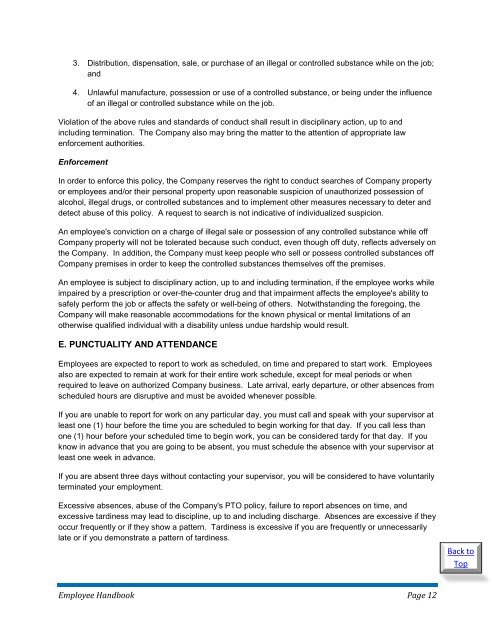employee handbook 1-1-15_no forms
You also want an ePaper? Increase the reach of your titles
YUMPU automatically turns print PDFs into web optimized ePapers that Google loves.
3. Distribution, dispensation, sale, or purchase of an illegal or controlled substance while on the job;<br />
and<br />
4. Unlawful manufacture, possession or use of a controlled substance, or being under the influence<br />
of an illegal or controlled substance while on the job.<br />
Violation of the above rules and standards of conduct shall result in disciplinary action, up to and<br />
including termination. The Company also may bring the matter to the attention of appropriate law<br />
enforcement authorities.<br />
Enforcement<br />
In order to enforce this policy, the Company reserves the right to conduct searches of Company property<br />
or <strong>employee</strong>s and/or their personal property upon reasonable suspicion of unauthorized possession of<br />
alcohol, illegal drugs, or controlled substances and to implement other measures necessary to deter and<br />
detect abuse of this policy. A request to search is <strong>no</strong>t indicative of individualized suspicion.<br />
An <strong>employee</strong>'s conviction on a charge of illegal sale or possession of any controlled substance while off<br />
Company property will <strong>no</strong>t be tolerated because such conduct, even though off duty, reflects adversely on<br />
the Company. In addition, the Company must keep people who sell or possess controlled substances off<br />
Company premises in order to keep the controlled substances themselves off the premises.<br />
An <strong>employee</strong> is subject to disciplinary action, up to and including termination, if the <strong>employee</strong> works while<br />
impaired by a prescription or over-the-counter drug and that impairment affects the <strong>employee</strong>'s ability to<br />
safely perform the job or affects the safety or well-being of others. Notwithstanding the foregoing, the<br />
Company will make reasonable accommodations for the k<strong>no</strong>wn physical or mental limitations of an<br />
otherwise qualified individual with a disability unless undue hardship would result.<br />
E. PUNCTUALITY AND ATTENDANCE<br />
Employees are expected to report to work as scheduled, on time and prepared to start work. Employees<br />
also are expected to remain at work for their entire work schedule, except for meal periods or when<br />
required to leave on authorized Company business. Late arrival, early departure, or other absences from<br />
scheduled hours are disruptive and must be avoided whenever possible.<br />
If you are unable to report for work on any particular day, you must call and speak with your supervisor at<br />
least one (1) hour before the time you are scheduled to begin working for that day. If you call less than<br />
one (1) hour before your scheduled time to begin work, you can be considered tardy for that day. If you<br />
k<strong>no</strong>w in advance that you are going to be absent, you must schedule the absence with your supervisor at<br />
least one week in advance.<br />
If you are absent three days without contacting your supervisor, you will be considered to have voluntarily<br />
terminated your employment.<br />
Excessive absences, abuse of the Company's PTO policy, failure to report absences on time, and<br />
excessive tardiness may lead to discipline, up to and including discharge. Absences are excessive if they<br />
occur frequently or if they show a pattern. Tardiness is excessive if you are frequently or unnecessarily<br />
late or if you demonstrate a pattern of tardiness.<br />
Back to<br />
Top<br />
Employee Handbook Page 12


